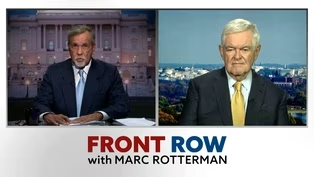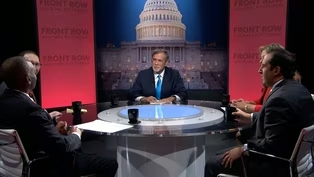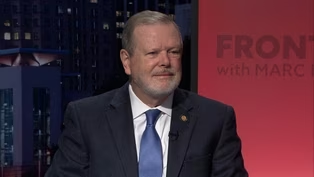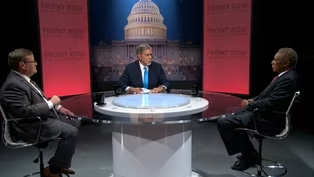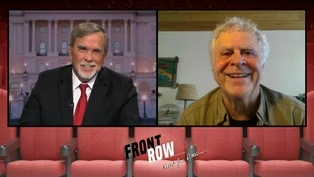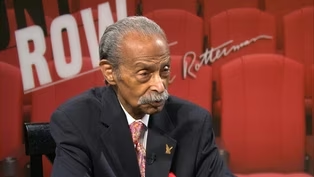
A Conversation with NC Attorney General Josh Stein (2021)
Season 11 Episode 25 | 26m 46sVideo has Closed Captions
A conversation with NC's Attorney General Josh Stein.
This week on FRONT ROW with Marc Rotterman: A conversation with NC's Attorney General Josh Stein. We discuss his investigation of Instagram, get his thoughts on NC's Voter ID case, and a lot more.
Problems playing video? | Closed Captioning Feedback
Problems playing video? | Closed Captioning Feedback
Front Row with Marc Rotterman is a local public television program presented by PBS NC

A Conversation with NC Attorney General Josh Stein (2021)
Season 11 Episode 25 | 26m 46sVideo has Closed Captions
This week on FRONT ROW with Marc Rotterman: A conversation with NC's Attorney General Josh Stein. We discuss his investigation of Instagram, get his thoughts on NC's Voter ID case, and a lot more.
Problems playing video? | Closed Captioning Feedback
How to Watch Front Row with Marc Rotterman
Front Row with Marc Rotterman is available to stream on pbs.org and the free PBS App, available on iPhone, Apple TV, Android TV, Android smartphones, Amazon Fire TV, Amazon Fire Tablet, Roku, Samsung Smart TV, and Vizio.
Providing Support for PBS.org
Learn Moreabout PBS online sponsorshipMore from This Collection
Explore this collection of special interviews from FRONT ROW with Marc Rotterman.
August 26, 2022 - FRONT ROW with Marc Rotterman
Video has Closed Captions
A conversation with former Speaker of the House Newt Gingrich (26m 46s)
Video has Closed Captions
A long awaited reunion, Samaritan's Purse fills children's boxes & Habitat for Humanity. (26m 46s)
A Conversation with Senator Phil Berger (2021)
Senate Leader Phil Berger discusses NC's budget, redistricting, and the Leandro case. (26m 46s)
A Conversation with Speaker Tim Moore & Sen. Dan Blue (2021)
Video has Closed Captions
A conversation with NC Speaker of the House Tim Moore and Sen. Dan Blue. (26m 46s)
A Conversation with Homer Hickam (2020)
Video has Closed Captions
Host Marc Rotterman has a conversation with Homer Hickam. (26m 46s)
A Conversation with Henry "Mickey" Michaux (2019)
Video has Closed Captions
Henry "Mickey" Michaux joins host Marc Rotterman for an exclusive interview. (26m 46s)
Providing Support for PBS.org
Learn Moreabout PBS online sponsorship[dramatic orchestral music plays] - Hi, I'm Marc Rotterman.
Coming up, a conversation with North Carolina's attorney general, Josh Stein, next.
- [Announcer] Major funding for Front Row was provided by Robert L Luddy.
Additional funding provided by Patricia and Koo Yuen through the Yuen Foundation; committed to bridging cultural differences in our communities.
And, by... ♪ Funding for the Lightning Round is provided by NC Realtors, Helen Laughery, Mary Louise and John Burress.
Rifenburg Construction, Stefan Gleason, and Jane and Van Hipp.
A complete list of funders can be found at pbsnc.org/frontrow.
[dramatic orchestral music continues] - Welcome back to Front Row, Mr. Attorney general, - Marc, it's a pleasure to be with you.
- Great to have you.
It's becoming an annual event.
Let's start with your investigation, if you don't mind in the Instagram.
- Yes, Instagram is owned by Facebook and it's a social networking site that teens use, tens of millions of American teens use it.
And, the whole purpose of Instagram is they try to get the kids to use it over, and over, and over.
They try to make it essentially- - Repeat business.
- Addictive.
They want it to be addictive, and what's very troubling about it is that studies show that kids who use Instagram have serious mental health effects.
There's depression, anxiety, the...
Even Instagram's own research shows that one out of three girls, teenage girls who use it, have body issues, body image issues.
So, this is a real problem, And, it's why I have joined with a bipartisan group of attorneys general from around the country.
- Multi-state.
- Multi-state investigating Instagram to find out what their business model is, and what is the effect on America's teens?
- Well, they're a monopoly, aren't they?
Facebook, Instagram, Twitter.
- They control a huge percentage of the social media market as it relates to teenagers.
And, we are aware of their desire to grow bigger and bigger to hook kids to the service.
And, then that has really negative mental health consequences.
- Well, should they be regulated?
- They should be regulated.
Congress absolutely should step in and regulate these big tech social media sites.
And, I mean, I've written letters to Congress urging them to do so.
- [Marc] Do you think they have the will to do that?
- Congress?
There is bipartisan agreement that these big tech companies are too big, and too powerful, and have real negative effects on people's lives.
But, whether they have the ability to get the ball across the goal line, I'm not sure.
- It's so partisan up there.
I wonder if they can get anything done at times.
- But, I don't even think...
I wouldn't blame this on partisanship.
I would blame this on power and those companies have a lot of power.
- They got a lot of donations too, right?
I wanted to talk to you about another, change gears a little bit, bring us up to on North Carolina's voter ID case.
- There are two cases.
There's a federal lawsuit against the voter ID law, and there's a state lawsuit against the voter ID law.
My job as attorney general is to defend North Carolina law, as long as that law's consistent with the US constitution.
And, that's what we're doing.
And, more importantly, the lawyers, the professional staff of the attorney general, the career people who don't pay attention to elections, they are doing their job diligently.
And, in fact, the federal district court judge and the full fourth circuit panel, 15 appellate court judges said that our office is doing a good job, conscientious, vigorously defending the state's interest.
And, so it really doesn't matter what my personal political views are on this or other issues, I have a job to do, and that's what the office is doing.
- Well, but it's in front of the Supreme court and they're intervening to give, potentially, Senator Berger and Tim Mora saying what happens.
- That's what they have sought the Supreme court review to review.
We'll see what the Supreme court does with it, but on the courts that have acted so far, it's been very clear.
They said, that's not necessary, because we're doing a good job.
- Is it premature to say that you'll have to use a voter... An ID to vote midterms?
- I don't know.
I'd said that there were two cases.
There's the federal case and the state case, the state case, currently, there is an injunction against that requirement.
We'll see what the state courts end up doing.
- Let's move on to talk about that, the negotiation and the settlement you made with opioid manufacturers.
- Really proud of my office.
We help to lead, along with Tennessee, this 50 state coalition, again, bipartisan, every AG in the country to hold Purdue Pharma and the Sackler family, which was really the company that started this whole problem, but all these other drug companies accountable, and we are winning.
We've secured resolutions in excess of $30 billion so far.
That's the second biggest multi-state-- - How much of that comes to North Carolina?
- North Carolina's share is gonna be, approximately, 900 million, when you put in all the different agreements together.
And, what's great about the 900 million and the 30 billion is almost all of it must go to attack the problem of opioid overdoses, because you and I know the problem is worse today, because of COVID, than it was two years ago.
All the things that are driving so many problems, the isolation, the job loss, the insecurity, the anxiety, the things that COVID created, that's what drives drug use, and drug addiction, and drug overdose.
And, so we've seen an incredible spike in overdose deaths.
- So, without being mean, no more NARCAN, more programs to get people in rehab.
How would that work?
- The money goes to exactly what you just said, Marc.
It can go to keep people, keeping people alive with NARCAN, and post overdose response teams.
It goes to treating people who have addiction, having them be able to get the healthcare They need to overcome their substance use disorder.
And, then it goes to all manner of recovery services, support groups, housing that's for people in halfway housing, employment services, things that people need when they've put the addiction behind them, they've now got to be successful in life, and we want to help everyone put this addiction behind them and lead that happy, free life.
- 75% Of these overdoses are fentanyl related, correct, sir?
- Most of them by far right now are fentanyl related.
A lot of people began their addiction with the pills, and now they're moving to heroin and heroin laced with fentanyl.
Fentanyl is a super powerful-- - It's almost in everything, cocaine, everything, right?
- Yeah, drug users, I mean drug dealers are lacing marijuana, cocaine, methamphetamine, they're putting fentanyl in everything.
It mainly comes from China, but also Mexico.
And, it's incredibly cheap and insanely deadly.
- Are they flooding fentanyl through the mail to Americans here?
- They use the mail, they send it through the mail.
They also use trucks to bring it in from Mexico.
That...
It is so cheap, like $5,000 buys you a brick and then they can make...
It only takes a couple of grains to add to a particular drug delivery.
- Well, we've seen record fentanyl seizures at the border.
Are we doing a good job securing the border in that regard, you think?
- We're doing the best we can.
We can do... Maybe, not the best we can.
We're doing it conscientiously, and we need to do a better job of it.
But, really the final answer, the ultimate answer to this problem is to help people who are addicted, who, every day, wake up saying, I need that morphine molecule in my body.
We have to liberate them of that.
- It's destroying entire communities.
- Communities, families, it's in every family.
I mean, it's in every family, whether you know it or not.
And, it's heartbreaking, because parents are just wondering, is this the day they're gonna get the call.
- I'm changing topics on you again, man, to talk about another addiction, that's e-cigarettes.
You made an agreement with Juul.
- Really, again, another thing I'm very proud of my team.
North Carolina was the first state in the country to take Juul to court for its role in addicting a new generation of teenagers to nicotine.
Juul is this little e-cigarette.
It looks like a USB drive.
And, so a lot of parents don't even know what it is and it charges in your computer, like it's a USB drive.
It heats up this chemical aerosol that kids inhale deep into their lung.
It was flavored.
Kids got addicted.
We had driven teen smoking from 30% to less than 5% over 20 years.
In a matter of three years, it went from 5% back up to 30%, almost all attributable to Juul.
Well, we've held them accountable.
They are fundamentally changing the way they do business here in North Carolina, they're paying the state $40 million that we can then use to help kids conquer their addiction.
I've now launched... Broadened the investigation, I'm suing the founders of Juul, because they pocketed hundreds of millions of dollars, if not billions, and they need to be held accountable.
And, I'm also looking at the companies that are filling the vacuum now that Juul is abiding by the rules of the road.
- Okay.
I want to talk about a controversy that's been going on for years.
A case that's been going on for years, and that's the Leandro case, talk to us about that.
- Well, there is nothing that we do as a state government, more important than educating our children.
Education is what gives any child in this state, the opportunity to achieve their dream, to achieve their potential, to make it however they want, provide for their family.
And, we have not been doing a good enough job with that, educating our kids.
And, that's what the lawsuit fundamentally is about.
And, what we need is to recruit better teachers by paying them more.
We need to train teachers, so that they're more effective in the classroom.
We need to support our educators with counselors, and school nurses, and social workers, so that kids have the skills they need to succeed.
We need strong principals at every school, kids need to come to school in kindergarten, ready to read, and write, and healthy.
And, that's what pre-kindergarten programs do.
And, we, as a state, are falling short on all of those fronts.
- So, the judge has said to the state, you need to spend $1.7 billion, but now there's an appellate court that weighed in, correct?
- That's right.
- And, what was the result of that?
- The appellate court said, hold on, we need to review this.
And, my office urged the court to issue that stay.
I believe that if the courts do come up with an order, it has to have the support and approval of our North Carolina appellate courts to have the legitimacy that it would require.
- So, is it constitutional, you think in your view, sir, that a judge can tell the state how to spend money, appropriate money?
- That's what the appellate courts need to decide.
- So, but you.. Generally, that falls under the general summary, correct?
So, what Leandro's, some of these folks are basically saying, is general assembly is not doing our job, getting the money for education.
- And, the court, the Supreme court, issued its decision in 2004.
So, the state legislatures had 17 years under Democrats and Republicans to get it right, and has not yet done so.
- Likelihood, it goes to the North Carolina Supreme Court?
- I would not be surprised.
I expect that's where it'll land.
- Okay, let's talk about the latest session of the general assembly.
Will you, pretty please, what they did for law enforcement in some of your programs?
- Yeah, on the criminal justice side, I think that the legislature did some really positive things and I appreciate the partnership that my office and our state crime lab has had with the general assembly in recent years.
We had, as a state, more untested sexual assault kits than any state in the country a couple of years ago.
So, my office has developed a strategy to attack that backlog, and we're succeeding.
We're solving cold cases, something like 60 some odd arrests have been responsible for nearly 90 cases, 90 crimes, because each one of those victims, Marc, deserves justice.
And, that's what this effort's about.
The legislature gave us $9 million, which we believe at the current cost to testing the kits will give us the funds we need to eliminate the backlog once and for all.
And, then they also gave the state crime lab another eight scientists, so we can maintain the current flow of cases.
So, the backlog never develops in North Carolina again.
And, that's a great victory for public safety.
- And, over a period, we've done a lot on criminal justice reform, correct?
Talk to us about that.
- There was a bill called SB 300 and it was a comprehensive criminal justice reform bill.
I want to salute Senator Danny Britt, who was the lead force behind the legislation, also Senator Mujtaba Mohammed, a number of people in the house.
This was something, again, bipartisan, a lot of people don't realize government can work and we can work together across party lines to actually get things done.
- Are we doing a pretty good job of that in North Carolina, you think?
- I think we can always do better.
I mean, I'm not gonna lie.
We could always do better, but it happens.
And, I think when it happens, we should acknowledge and celebrate it.
And, this criminal justice reform bill is one of those examples, because it will help us recruit better officers into the profession.
We'll have better training.
There'll be better policies such as a duty to intervene, if you see a fellow officer acting outside their scope of authority or using excessive force, there's a quick intervention requirement, so that if an officer is doing things not quite right, let's correct that misbehavior early so that they can succeed as a law enforcement officer.
And, then if they can't, then they need to find another job that doesn't have a badge and a gun.
And, there are accountability provisions in this law that will ensure that officers can't wander from one agency to the next.
- Well, we are having... We've seen record number of police officers killed this year and shot, I think 314 shot, 58 killed.
I think there's a bill and... Up in Congress called protect and serve.
Are you familiar with that?
- I'm not familiar with it.
- Which was make it a bigger... More of a federal crime to kill a police officer.
Are we having problems in North Carolina with retention?
- There are issues with retention.
And, that was another thing that the legislature did in response to a request in my office, which is to fully fund what we call the CJ fellows program, criminal justice fellows.
It's modeled on the North Carolina teaching fellows program, which identifies and recruits talented high schoolers who are leaving and say, hey, if you want to pursue a career in law enforcement, go get your two year degree.
We'll lend you the money.
And, if you serve in law enforcement in North Carolina for four years, we will forgive your loan in its entirety.
And, the legislature for the first time has fully funded that program.
A hundred new kids every year have the potential to enroll.
- We're also having problems, aren't we, sir, with retaining correction officers?
- Yep.
And, the legislature increased the pay for retention for correction officers, which was critical.
- As of December 1st, there are some new laws on the books.
Talk to us about those.
- Well, a lot of them on the criminal justice side are the ones I just talked about, this SB 300, that's gonna improve recruitment training and accountability of law enforcement to raise the professionalism of it.
We have a law that raised the age of juvenile jurisdiction.
What this means is a six year old who, and this actually happened, picked a flower out of somebody's yard at a school bus stop, got arrested for a misdemeanor, a six-year-old.
We were the only state in the country that had juvenile jurisdiction as young as six, written in our statutory code, where the legislature has raised that to 10, with the exception of a few very serious felonies, which it's eight.
So, that was one law change.
Another is we were one of the only states that allowed incarcerated women to be shackled during their pregnancy.
And, that is now prohibited.
- But, even if you're a juvenile, repeat offenders still have to go to court?
- If you're a juvenile, you will go to juvenile court.
And, yes, I mean, we need to get kids on the straight and narrow.
And, there are ways to do that.
- I want to circle back to what the general assembly did on emergency powers.
Was that the right thing to do with the... What they did with the governor?
- The legislature has a lot of authority and they have a big job, which is to pass laws and appropriate funds.
They are very eager to do the work of other governments, whether it's city governments, trying to tell them how to do their job, take away power from the governor, take away my authority.
They had a provision-- - Well, what were they trying to do with you?
And, what was the...
The result?
- The result is the law reads that they have to approve of any settlement that my office enters having to do with constitutional matters.
- Are you gonna challenge that?
- The courts will resolve that issue, because the legislature has enough to do of its own.
They don't need to do my job as well.
- Should the governor have unlimited emergency powers or should he confirmed with the council of state in your view?
- Well, in something matters, the governor does confer.
I mean, I'm on the council of state.
And, I just had to concur with one of his requests to change the restrictions, requirements, on testing requirements for law enforcement, with Criminal Justice Standards Commission.
So, we already have the ability to weigh in on many matters.
- Let me ask you, what is your view on...
This is a little outside your scope, but somewhat still in your ballpark, your thoughts on a redistricting process?
- For our democracy to work, to thrive, the people need choose who their representatives are.
The will of the people, the consent of the govern must exist.
It is backwards to have legislators, representatives, choosing their voters, because what happens is it does two things.
One is it discriminates against certain voters, saying your vote doesn't count as much, based on either your race or your political views, and it locks them into power so that they're no longer accountable to the voters.
- So, will these new districts, in your view, withstand a court challenge?
- It remains to be seen.
The last round of maps, I was gravely concerned with the egregious partisan gerrymander that there was.
And, I actually filed a brief on behalf of the governor in state court, arguing that the state legislative maps violated our state constitution and the courts agreed, forcing the legislature to redraw those maps.
- There are some conservatives, and some Democrats, and Republicans, let me say, who think we should have an independent process commission.
Do you concur with that?
- Yes, I agree.
Look, there's not gonna be a perfect way to do this, but one thing I am certain, is allowing people who have political power, use that political power to maintain their political power, that's not healthy for democracy in the long run.
- Let me ask you, we always talk about this every year, but robocalls were making progress.
- We're making progress, but at the same time we make progress, There's always a new challenge, but I'm doing everything in my power.
One thing that we urged the phone companies to do was implement a technology called stir shaken, and that addresses the problem of spoofing, where the number looks like it's a different number, but it's actually calling from India or wherever.
Well, that is now required of the big companies, but not the little companies.
I led a 51 AG coalition, bi-partisan, everyone in the country, to urge the FCC to move that requirement from two years to one years.
I also led an effort to, again, 51 AGS to urge the FCC to make sure that the small companies can't just sell out numbers to these illegal robocallers, without doing a little due diligence first.
They need to know who their customer is and not turn a blind eye to pocket the money.
And, the FCC, I think, is gonna go forward with that.
So, we need to...
It's constantly a game of cat and mouse.
We improve our technology.
We improve our enforcement.
They come up with a new way, but I'm on the job as best I can.
- And, around this time of the year, through Christmas, first of the year, we see a lot of phone scams.
- Yes, the phone scams, I mean, it costs vulnerable people billions of dollars in aggregate a year.
I had a woman in Raleigh this year who lost over a million dollars to these criminals.
I mean, it's cruel.
It's callous.
It's annoying to you and me, don't get me wrong.
That's bad too.
But, they don't exist to annoy us.
They exist to steal from vulnerable people.
And, so I'm gonna do everything I possibly can.
- Can they report that to your website, and what is that?
- If you go to my website, ncdoj.gov, I'm sorry, ncdoj.gov/norobo.
We have a form where you can fill out a complaint.
- And, can they call your office?
What's that number, sir?
- 8 7 7 5 NO SCAM.
- Every year, we talk about this, and I'm reticent to bring it up, your ongoing efforts to stop sex trafficking in this state, how we doing?
- Well, it's a very hard crime to know how we're doing, because it's so much in the shadows.
So, what we try to do is shine a bright light on it, have partnerships with industry, like truckers or even massage parlors, to make sure that people who exist where this crime occurs, they know where to call.
So, these posters are up.
- How organized is this?
And, are we seeing the cartels involved in this as well?
- It's definitely organized, because we have tools, law enforcement investigative tools, where we can actually track as they move down I-95, from New Jersey, through North Carolina, to Florida, where they run the same ad as they move people down.
And, law enforcement is partnering with these nonprofit partners to go after the criminals.
- People are really worried about energy costs right now.
You've been ahead of the curve on price gouging.
Talk to us about that.
- Yeah, I mean, some things are... We can control, other things we can't control.
And, obviously the price of oil is a global commodity.
And, so it's very difficult to be able to really control it.
I commend the president for allowing the release of some of the reserves and the strategic petroleum reserves to try to-- - That's only about a two day fix, right?
- But, I mean, that... We got to use whatever tools we have in this imperfect world.
And, our hope is is that gas prices come under control as quickly as possible.
- Well, long-term, when we look at this, are we having too many mandates, and are we putting too much regulation on some of our energy?
Is there a fine balance there?
- I mean, the energy that we're talking about, say the... With duke energy providing heat, that happens independent of what happens with the gas we put in our cars.
So, I think it's important to think about what type of energy are we talking about.
There is vast potential for more renewable generation here in North Carolina, whether it's solar, wind, onshore, or offshore, even using animal feed waste to generate methane, to power natural gas, there's a real opportunity-- - Were we energy independent prior to the Biden administration shutting down some of these pipelines, putting in some of these regulations?
- We were, yes.
- And, do you think that's wise, what he's doing right now, putting more regulations on the oil industry?
- Well, we want to make sure that we don't have dangerous oil spills that cause all manner of problems.
What I don't want is that deep water horizon spill that happened in the Gulf to happen off the outer banks, or happen off of Emerald isle, or happen off of-- - But, isn't a pipeline more secure, cleaner, faster?
I mean, for it to be able to deliver oil to us.
- Yeah, I mean the Keystone Pipeline is not within my body of work.
- Yeah, I know.
Well, we have...
There are some pipelines that we had here that just... We don't have now, but-- - Well, and just to be clear, those were permitted by the state, and my office defended those permits, and the court struck them down.
So, we did what we could do.
- Let me ask you, are you concerned about the influx of people who are coming in to this country from other countries that are not citizens?
- Well, I think that immigration helps in some ways, as long as it's legal immigration, what we don't want is people just coming across the border.
- I mean, are you concerned about the people who are... Afghans who are not vetted?
- Well, I think the Afghans are vetted.
- Well, some of them are vetted but... - Well, which ones aren't?
- Well, a lot of those first... A lot of the first came over have not been vetted.
- Well, they're in the process of being vetted.
- How do you vet somebody who doesn't have any background, who does not own a computer though?
- So, is your point that people should have been left?
The people who provided translation services to our soldiers for years, we should have abandoned them to Afghan?
- No, I'm all for that, but I'm not sure-- [crosstalk] - That was what the plan was.
And, the... 125,000 people were evacuated from Afghanistan in a six week period of time, which was a real accomplishment.
And, of course, I mean the 13 lives who died... - Yeah, it was a little messy, I'd have to say.
- Of course it was messy.
I mean, name a time a country has evacuated another country that wasn't.
- This has really gone fast.
I always enjoy having you, sir.
That's it for us.
Thanks for watching.
Have a great weekend.
See you next week on Front Row.
[orchestral music plays] - [Announcer] Major funding for Front Row is provided by Robert L Luddy.
Additional funding provided by Patricia and Koo Yuen, through the Yuen foundation, committed to bridging cultural differences in our communities, and by... Funding for the Lightning Round is provided by NC Realtors, Helen Laughery, Marie Louise and John Burris, Rifenburg Construction, Stefan Gleason, and Jane and Van Hipp.
A complete list of funders can be found at pbsnc.org/frontrow.
♪

- News and Public Affairs

Top journalists deliver compelling original analysis of the hour's headlines.

- News and Public Affairs

FRONTLINE is investigative journalism that questions, explains and changes our world.
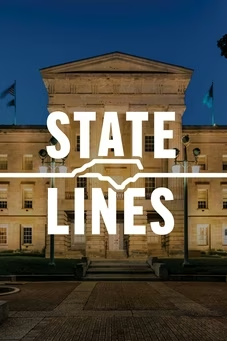











Support for PBS provided by:
Front Row with Marc Rotterman is a local public television program presented by PBS NC
